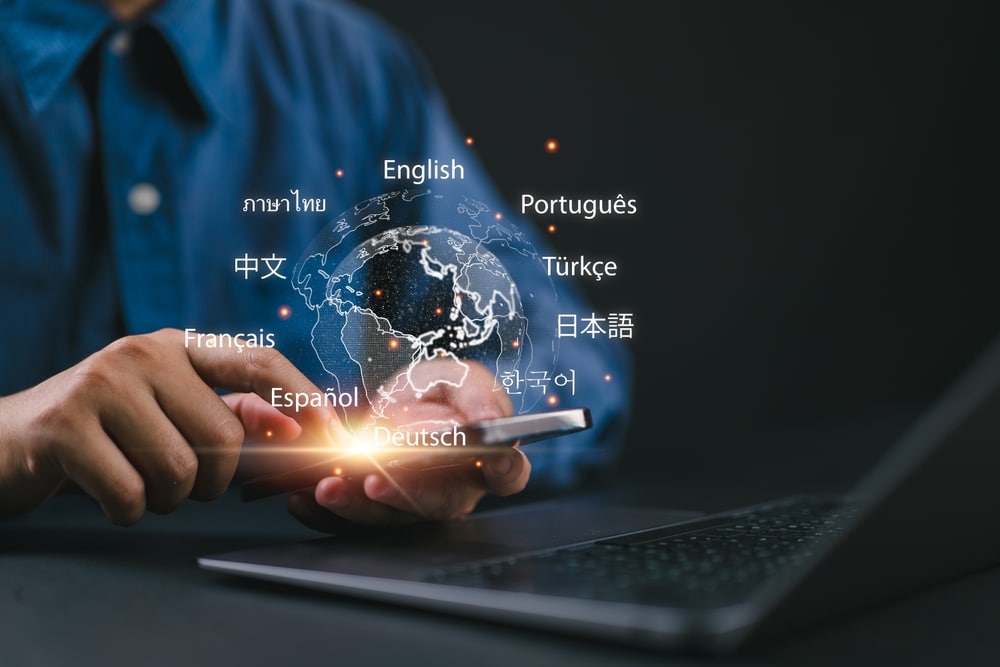What Is Legal Translation?

The pen is mightier than the sword in a courtroom. Legal decisions can pivot on a single word or comma in a contract or transcription, and adding multiple languages to the mix multiplies the possibility of inadvertent outcomes.
Professional legal translation is a specialty that requires accuracy, training, and awareness of shifting cultural and jurisdictional contexts to provide documents critical to all stages of discovery, negotiation, and trial.
What Is Translation?
Let’s start with simple translation. At a professional level, translation goes beyond the process of word-by-word conversion of one language to another. Languages and dialects differ in:
- Lexicon, meaning that some words will not have a direct equivalent1
- Grammar and syntax
- Nuances of specific words, phrases, or ideas
Translators need to be able to identify the most accurate and efficient way to restate text from one language to another without losing the document’s direct and indirect meaning or adding a personal twist.
Changes in Language
Language isn’t a fixed object—it shifts over time. In 2024 alone, Dictionary.com added more than 1,700 new words.2 This demonstrates the dynamic nature of language and the constant need for translators to adapt and stay up-to-date on language adaptations and additions.
Cultural Context
Language is intrinsically tied to culture. What is said and unsaid reflects history, landscape, habits, religion, and beliefs. Translators aren’t the equivalent of a bilingual dictionary—they must understand:
- Idioms (such as the aforementioned “the pen is mightier than the sword”)
- Culturally specific words
- Coded messages
- Impact of structure and language choices
Legal Translation Defined
So, what is legal translation? Legal translation is the process of converting legal documents and texts from one language to another while preserving their precise meaning, terminology, and legal validity.
Every space and character in a document can impact an outcome under the law. Legal translators must be able to maintain all the general translator functions above and then expand their skills to include the following specialties.
Legal Wording as a Dialect
The verbiage of a courtroom transcript or a detailed contract can be similar to a foreign language to the average layperson. This is because language is used in very precise and often nontraditional ways when it comes to the law.
A legal translator needs to master the fine points of two languages, not just in terms of common usage, but within the frameworks of the judicial systems of each pertinent jurisdiction. This means that an expert who specializes in translations of literature, science, medicine, or any other practice is not able to stand in for a legal translator.
Legal Knowledge
In addition to mastering core languages, legal translators must be familiar with the concepts of each jurisdiction when multiple legal systems are involved. This includes:
- Courtroom procedure
- Litigation stages
- Titles and roles of key individuals
Legal Translation vs. Interpretation
Translation and interpretation within the legal sector have many overlapping requirements and functions, but there are distinctions. While interpretation shares a connection with translation services, the focus differs concerning the medium.
Translators work from written text, while interpreters specialize in transcribing across languages from immediate oral sources. “Sight translation” is a hybrid practice of reading text from a document aloud into another language.3
Converting across languages from oral sources vs. written typically requires additional skills and deeper expertise, taking into account how spoken words are nuanced by:
- Tone
- Nonverbal communication
- Culture-specific gestures and expressions
- Context
The translator must decide when to add these elements to the written record so as to provide cultural context for the audience.
Legal translators have time to review and produce results working with documents and recordings, as compared to trying to simultaneously balance all of this knowledge and provide an experience as close as possible to a single-language event.
Live deposition and courtroom interpreters, on the other hand, provide immediate, real-time translation from one language to another and back—which means having native or near-native knowledge of both languages.
Legal Translation Services Outside of Litigation
Professional legal translation isn’t limited to criminal matters or global contract disputes. There are diverse legal documents where translation—or mistranslation—can lead to civil litigation, such as:
- Human resources policies and employee handbooks
- Adoptions and custody arrangements
- Insurance claims
- Investment reports
In these cases, effective legal translation is critical as a preventive measure rather than integral to active litigation, particularly when the activities or agents will cross international borders.
Rely on the Experts for Legal Translation
U.S. Legal Support has provided exceptional litigation support services to legal industry partners since 1996. When it comes to legal translation services, we have the experts and technology to serve your needs across borders and dialects, covering written legal documents as well as audio and video transcription.
In addition to wholly human assignments, we offer AI translations—a speedy and cost-effective approach particularly suited to voluminous documents. Once you identify specific sections or pages, you can assign them to an expert for a human-certified 100% accurate translation.
Ready to learn more? Reach out today to connect with us on your legal support needs.
Learn more today about how we can help with your legal translation and other litigation support needs.
Sources:
- Panhellenic Association of Professional Translators Graduates of the Ionian University (PEEMPIP). Put that legal translation down and move away slowly. https://blog.peempip.gr/put-that-legal-translation-down-and-move-away-slowly/
- WashingtonPost. Barbiecore? Bed rotting? Greedflation? Dictionary.com adds new 2024 words. https://www.washingtonpost.com/style/2024/02/13/dictionary-com-new-words-2024/
- The National Association of Judiciary Interpreters and Translators (NAJIT). Frequently Asked Questions: Court and Legal Interpreting and Translating. https://najit.org/resources/the-profession/#faq

Editoral Policy
Content published on the U.S. Legal Support blog is reviewed by professionals in the legal and litigation support services field to help ensure accurate information. The information provided in this blog is for informational purposes only and should not be construed as legal advice for attorneys or clients.


